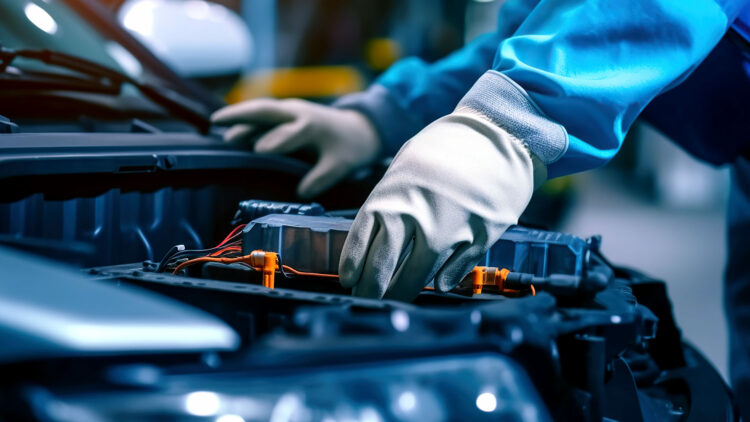The UK car industry has been shifting its focus towards manufacturing electric vehicles (EVs) despite the government’s decision to delay the deadline for the switch to EVs. Car production in August 2023 saw a decrease of almost 10%, while vehicles with electric propulsion continued to grow by almost 3%.
Domestic sales in August were hit hard by high interest rates from UK banks, resulting in a decline of over 25%. However, the overall numbers for 2023 show a year-on-year increase of almost 12%. At least 2 out of 5 cars now have an electric propulsion motor.
The Society for Motor Manufacturers and Traders (SMMT) believes that this drop in car sales during the summer is not a cause for concern. SMMT CEO Mike Hawes stated that car manufacturers are using the summer holiday season to upgrade their plants and produce more electric vehicles. He emphasized the need for a strong and clear plan from the UK government regarding the transition to a carbon-neutral economy, specifically in transportation.
In Germany, energy giant E-On has outlined its “5 Impulses” for a successful transition to a sustainable economy. These impulses include a multi-faceted approach focusing on affordability, security of supply, and environmental compatibility; building resilient systems to minimize disruptions; improving energy markets to incentivize efficient production; creating close connections between government and energy players; and achieving consensus among political parties.
The SMMT emphasizes the importance of stable and smooth transition as the UK moves towards the future of energy. They call for attractive incentives and measures to encourage consumers to switch to EVs, including the acceleration of charging infrastructure. The SMMT believes that positive incentives are more effective in driving market growth than punitive measures.
Overall, the car industry is prioritizing the production of EVs despite challenges in the market. The SMMT urges the UK government to provide a clear roadmap for the transition to a carbon-neutral economy and to support the industry with favorable policies and incentives.
August sees nearly a 10% decline in UK car production compared to the previous year
The UK automotive industry has suffered a significant setback as recent data reveals a sharp decline in car production during the month of August, with figures standing almost 10% lower than the same period last year. This decline signals a worrying trend for an industry already grappling with various challenges, including fluctuations in consumer demand, Brexit uncertainties, and the global semiconductor shortage.
According to the Society of Motor Manufacturers and Traders (SMMT), the overall production of vehicles in the UK fell by 9.7% in August 2021 compared to August 2020, equating to a loss of approximately 22,000 units. Multiple factors contributed to this decline, one of which was the global semiconductor shortage that has plagued the automotive sector for several months. The shortage, resulting from factors such as increased demand for consumer electronics during the pandemic and disruptions in supply chains, has severely impacted car manufacturers’ ability to produce vehicles.
Moreover, the ongoing uncertainty surrounding Brexit has created additional hurdles for the industry. The UK’s departure from the European Union has disrupted long-established trade relationships and added complexities to supply chains. The introduction of new customs procedures, increased paperwork, and potential tariffs have resulted in delays and added costs for parts and components. These challenges have impacted the industry’s overall competitiveness and have led some manufacturers to relocate or restructure their operations.
Additionally, shifting consumer preferences and the transition to electric vehicles (EVs) have affected car production figures. Growing awareness of environmental issues and government initiatives to promote zero-emission vehicles have led to an increased demand for EVs. Consequently, many manufacturers have had to adapt their production lines and invest in EV technology, which has necessitated changes in manufacturing processes and affected overall output levels.
The decline in car production during August is concerning for the UK economy. The automotive industry is a vital contributor, employing hundreds of thousands of people across the country and generating significant revenue. The recent decline may have ripple effects throughout the supply chain, impacting suppliers, dealerships, and associated businesses, leading to potential job losses and financial strain.
To mitigate these challenges, the government and industry stakeholders must work collaboratively to address key issues affecting the automotive sector. This includes tackling the semiconductor shortage by establishing long-term strategies to ensure a stable supply of essential components. Additionally, efforts should be intensified to resolve the ongoing Brexit-related uncertainties, facilitating smoother trade processes and re-establishing seamless relationships with European partners.
Furthermore, investing in EV infrastructure, research, and development will help strengthen the industry’s position in the transition to cleaner vehicles. Offering financial incentives for consumers to purchase EVs and providing support for manufacturers to expand EV production will not only stimulate the market but also enable the industry as a whole to achieve sustainability goals.
In conclusion, the nearly 10% decline in UK car production during August is a concerning development for the automotive industry. The combination of global semiconductor shortages, Brexit complexities, and the transition to EVs has created a challenging environment for manufacturers. Urgent actions must be taken to address these issues collaboratively and ensure the long-term growth and competitiveness of the UK automotive sector.

